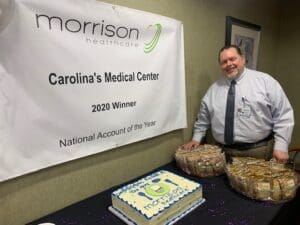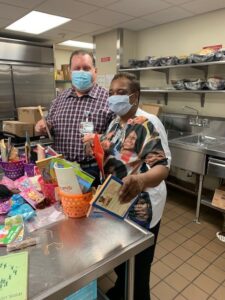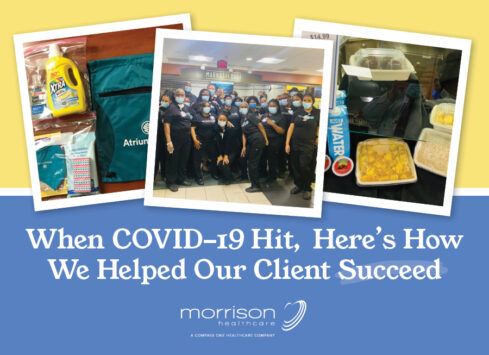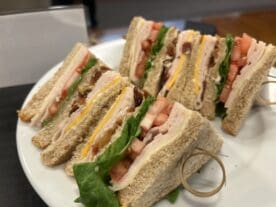When COVID-19 Hit, Here’s How We Helped Our Client Succeed
By Jeffrey Bernhardt, Regional Director of Operations for Atrium Health / Carolinas Medical Center, Levine Children’s Hospital, Mercy and Carolinas Rehab
 By now, everyone knows that the U.S. healthcare system faced a once-in-a-lifetime challenge in 2020 to care for millions of sick patients. What’s not as well-known is the behind-the-scenes commitment to help medical workers get the healthy food and nourishment needed to treat these patients.
By now, everyone knows that the U.S. healthcare system faced a once-in-a-lifetime challenge in 2020 to care for millions of sick patients. What’s not as well-known is the behind-the-scenes commitment to help medical workers get the healthy food and nourishment needed to treat these patients.
At Atrium Health, we worked to provide the best possible service for the medical staff during these trying times. With our café shutdown to hospital visitors for several months and a significant reduction in food purchases, we created new ways to serve all the hospital’s workforce.
It started by opening the “Morrison Market,” turning our café into a retail outlet offering household items and food items such as toilet paper, paper towels, milk, eggs, and coffee. This market enabled nurses, medical technicians and others access to essential, everyday items that they couldn’t get at the grocery store or they simply didn’t have time to visit.
We also made it easier for them to eat well once they left the hospital. As part of our take-out menu, we added “Purely Good” take-home meals, featuring rotisserie chicken, barbecued pork, baked meatloaf, and several types of quiches.
All meals could be pre-ordered and included side orders of potatoes and healthy vegetables. These consisted of dinners for up to four people with all side items and instructions for safely heat at home. We also offered pizzas for them before they left the hospital so they could simply reheat when they got home.
Next, we came up with a “Market on the Move” food cart that visited most floors throughout the day offering snacks and beverages. In some cases, we would take food and beverage carts to medical units facing staffing shortages for personnel that couldn’t get away from their units for their meals. For example, in the Emergency Room and Children’s Emergency Room, our culinary team took them meals at least once a week.
For those workers who had time to eat in the café, our retail team always did its best to keep at least two options available – a mix of comfort food and healthy food items, giving each person a choice. We also added sushi to our café menu, a “grab and go” item that was a huge hit. We’ve made this a permanent option since it became one of the most popular foods offered during the crisis.
In effect, we tried to think of every possible way to make their lives easier and let them know we were there to help them. And while it was a highly unusual year, it was a unique opportunity to demonstrate how we constantly focus on the needs of our hospital’s leaders and staff while also caring for patients.
We still offer take-home meals; hospital administrators asked us to keep offering this option since healthcare workers enjoy stopping by the café to pick up a complete meal.
Making Communication a Top Priority

A good client relationship begins with an open-door communications policy. This means that my door is open to anyone – from hospital administrator to frontline associate. If this policy is in place during normal times, it’s much easier to communicate with key leaders during a crisis.
Once the pandemic hit, there were often changing government rules that caused confusion. But it was paramount to communicate regularly with our staff to meet our client’s needs. I was fortunate to have a team of chefs, dining associates, and others completely dedicated to doing “whatever it takes” to meet the hospital’s needs.
Their dedication was evident even as they faced their own personal challenges. Some associates had to quarantine once they contracted the virus; others had trouble finding daycare for their children and still others needed to care for family members who became ill. By asking everyone to be mindful and empathetic to our teammates’ needs, everyone did their best to accommodate others.
We took several measures to help everyone take care of their families. For example, when the buses stopped running, offered Uber rides for staff, or in some cases picked staff up to get them to work.
For associates who usually put their children in daycare – which wasn’t available during the height of the pandemic – we altered their schedules to make it feasible for them to make it to work. Even with virtual classes for school-age children, many parents had to adjust schedules to make sure their children were logged in and participating in their classes.
Each department within the hospitals had its own group of challenges, and they quickly adapted to be successful. For example, when COVID-19 first shut down many operations, changes were occurring at a fast pace.
These included requirements for mask use, eye protection, and employee screening. For patient services, we needed to make changes to our protocol. In some cases, some associates would stay on a hospital floor while others would bring food carts to them. In other cases, the hospital asked us to drop off the carts to minimize the number of staff up on the floor. And while the changes were constant, we adapted.
We constantly reassured the hospital that no matter the need, our team was here to help them overcome it. I let them know we would meet any request as quickly as possible and no matter what, we would take care of the healthcare teammates. And if I don’t hear from them within a few days, I always reach out to see if there is anything they need.
Going the Extra Mile for Patients
Much of the credit for a solid working relationship with the hospital is the work of a team’s leaders and front associates. There are more than 300 people on the team here, and so many of them provide the care and compassion that make them special people.
During COVID-19, there were several instances where our Food & Nutrition Services associates made a special effort to take care of patients by delivering a unique meal or personal service.
For example, our team prepared and delivered special meals for patients who received transplanted organs; a special meal for a new mother and father, or a special “date night” meal for parents of a terminally ill child that hadn’t been on a date together in more than a year.
Hospitals and patients need us to be there during their time of need. By continuing to provide this kind of special care, Morrison will always be considered a vital part of any hospital’s operations. If we can deliver during these critical times, we can help hospitals succeed while caring for patients.

